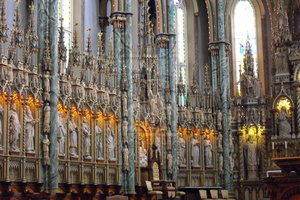
Jay Nordlinger, renowned for his spirited defense of the oppressed in Cuba and China, weighs in on the Wisconsin incidents:
A while ago, a couple of people involved in the Wisconsin case, on the conservative side — or the freedom side, or the rule-of-law side — came to visit us at National Review. They told us what had gone on. We listened in horror.
I had just finished reading, in pre-publication form, Roger Scruton’s novel about Communist Czechoslovakia. That book was not only fresh in my mind but pulsating all over my mind. And what I was hearing about Wisconsin, in good old Amurrica, reminded me of the book (as I noted to our guests). I was not being figurative, or poetic. I meant, it really reminded me of the book.
In the past, I’ve said that most people aren’t democrats at heart. The democratic spirit is relatively rare. Some people chastised me for saying this. I will now say that, at a minimum, many people aren’t democrats at heart. In a democracy, they must be curbed. They must be guarded against, constantly. Do not assume that people as a whole, including those in power, are devoted to the Declaration and the Constitution and Mom and Abner Doubleday and all that stuff. It isn’t true.
(source: ‘Wisconsin’s Shame’ . . . | National Review Online)

Consider and compare this vision of democracy, which I hold to be the chief reason “democracy” might just be worth having (at least on a scale where it is possible):
This is the first principle of democracy: that the essential things in men are the things they hold in common, not the things they hold separately. And the second principle is merely this: that the political instinct or desire is one of these things which they hold in common. Falling in love is more poetical than dropping into poetry. The democratic contention is that government (helping to rule the tribe) is a thing like falling in love, and not a thing like dropping into poetry. It is not something analogous to playing the church organ, painting on vellum, discovering the North Pole (that insidious habit), looping the loop, being Astronomer Royal, and so on. For these things we do not wish a man to do at all unless he does them well. It is, on the contrary, a thing analogous to writing one’s own love-letters or blowing one’s own nose. These things we want a man to do for himself, even if he does them badly. I am not here arguing the truth of any of these conceptions; I know that some moderns are asking to have their wives chosen by scientists, and they may soon be asking, for all I know, to have their noses blown by nurses. I merely say that mankind does recognize these universal human functions, and that democracy classes government among them. In short, the democratic faith is this: that the most terribly important things must be left to ordinary men themselves — the mating of the sexes, the rearing of the young, the laws of the state. This is democracy; and in this I have always believed.
But there is one thing that I have never from my youth up been able to understand. I have never been able to understand where people got the idea that democracy was in some way opposed to tradition. It is obvious that tradition is only democracy extended through time.
It is trusting to a consensus of common human voices rather than to some isolated or arbitrary record. The man who quotes some German historian against the tradition of the Catholic Church, for instance, is strictly appealing to aristocracy. He is appealing to the superiority of one expert against the awful authority of a mob. It is quite easy to see why a legend is treated, and ought to be treated, more respectfully than a book of history. The legend is generally made by the majority of people in the village, who are sane. The book is generally written by the one man in the village who is mad. Those who urge against tradition that men in the past were ignorant may go and urge it at the Carlton Club, along with the statement that voters in the slums are ignorant. It will not do for us. If we attach great importance to the opinion of ordinary men in great unanimity when we are dealing with daily matters, there is no reason why we should disregard it when we are dealing with history or fable. Tradition may be defined as an extension of the franchise. Tradition means giving votes to the most obscure of all classes, our ancestors. It is the democracy of the dead. Tradition refuses to submit to the small and arrogant oligarchy of those who merely happen to be walking about. All democrats object to men being disqualified by the accident of birth; tradition objects to their being disqualified by the accident of death. Democracy tells us not to neglect a good man’s opinion, even if he is our groom; tradition asks us not to neglect a good man’s opinion, even if he is our father. I, at any rate, cannot separate the two ideas of democracy and tradition; it seems evident to me that they are the same idea. We will have the dead at our councils. The ancient Greeks voted by stones; these shall vote by tombstones. It is all quite regular and official, for most tombstones, like most ballot papers, are marked with a cross.
(source: Orthodoxy by Gilbert K. Chesterton, Chapter 4, emphasis added, and with apologies for Chesterton’s copious employment of “mere rhetoric”)

If you believe in the Resurrection, you really have no choice but to consider the only real democracy the “democracy of the dead and the living” together, and to regard whatever popular misunderstanding militates against that as a doomed error–the only real demos, in the end, is the People of God. Whatever allows them to serve the world by proclaiming and living the Gospel, Word and Sacrament and the consequences of each, is blessed and legitimated by doing so. Whatever does not, however conceived, loses that blessing and–measure by measure–its claim to legitimacy. When it passes, there will be another transient state of affairs, and another; Ozymandias will still boast, and Abraham Lincoln will still be right about this, at least: “The world will little note, nor long remember” the stagecraft and machinery of politics; but who makes people free to stand on their dignity, to suffer evil and turn to good, to learn what true “Sons of Liberty” know, is doing something perduring, no, eternal.
True “Sons of Liberty”?
If you continue in my word, you are truly my disciples, and you will know the truth, and the truth will make you free.
[…]
Truly, truly, I say to you, every one who commits sin is a slave to sin. The slave does not continue in the house for ever; the son continues for ever. So if the Son makes you free, you will be free indeed.
(source: John 8 RSVCE)
But be doers of the word, and not hearers only, deceiving yourselves. For if any one is a hearer of the word and not a doer, he is like a man who observes his natural face in a mirror; for he observes himself and goes away and at once forgets what he was like. But he who looks into the perfect law, the law of liberty, and perseveres, being no hearer that forgets but a doer that acts, he shall be blessed in his doing.
(source: James 1 RSVCE)
One can also call them “disciples.”

